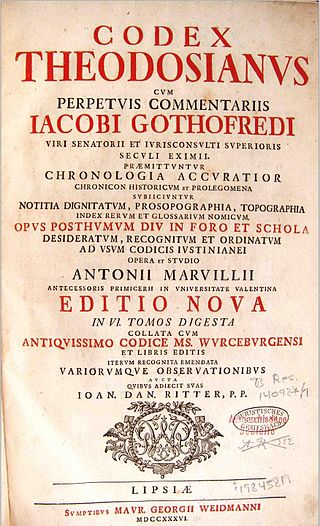Related Research Articles

The Codex Theodosianus is a compilation of the laws of the Roman Empire under the Christian emperors since 312. A commission was established by Emperor Theodosius II and his co-emperor Valentinian III on 26 March 429 and the compilation was published by a constitution of 15 February 438. It went into force in the eastern and western parts of the empire on 1 January 439. The original text of the codex is also found in the Breviary of Alaric, promulgated on 2 February 506.
Peter Salway, FSA is a British historian, who specialises in Roman Britain. He lectured at the universities of Durham, Cambridge, Bristol and Oxford, before becoming Professor of the History and Archaeology of Roman Britain at the Open University.
Michael Hewson Crawford, is a British ancient historian and numismatist. Having taught at Christ's College, Cambridge and the University of Cambridge, he was Professor of Ancient History at University College London from 1986 until he retired in 2005.

Sir Bernard Walter Silverman, is a British statistician and former Anglican clergyman. He was Master of St Peter's College, Oxford, from 1 October 2003 to 31 December 2009. He is a member of the Statistics Department at Oxford University, and has also been attached to the Wellcome Trust Centre for Human Genetics, the Smith School of Enterprise and the Environment, and the Oxford-Man Institute of Quantitative Finance. He has been a member of the Council of Oxford University and of the Council of the Royal Society. He was briefly president of the Royal Statistical Society in January 2010, a position from which he stood down upon announcement of his appointment as Chief Scientific Adviser to the Home Office. He was awarded a knighthood in the 2018 New Years Honours List, "For public service and services to Science".

Francis Crawford Burkitt was an English theologian. As Norris Professor of Divinity at the University of Cambridge from 1905 until shortly before his death, Burkitt was a sturdy critic of the notion of a distinct "Caesarean Text" of the New Testament put forward by B. H. Streeter and others.

Sir Malcolm John Grant,, FAcSS is a barrister, academic lawyer, and former law professor. Born and educated in New Zealand, he was the ninth President and Provost of University College London – the head as well as principal academic and administrative officer of the university – for over a decade from 2003 until 2013.
The Codex Gregorianus is the title of a collection of constitutions of Roman emperors over a century and a half from the 130s to 290s AD. It is believed to have been produced around 291–294 but the exact date is unknown.
The Codex Hermogenianus is the title of a collection of constitutions of the Roman emperors of the first tetrarchy, mostly from the years 293–94. Most of the work is now lost. The work became a standard reference in late antiquity, until it was superseded by the Breviary of Alaric and the Codex Justinianeus.

Simon Corcoran is a British ancient historian and lecturer in ancient history within the School of History, Classics and Archaeology, Newcastle University.
A research fellow is an academic research position at a university or a similar research institution, usually for academic staff or faculty members. A research fellow may act either as an independent investigator or under the supervision of a principal investigator.
Marcus Sergius or Servius Octavius Laenas Pontianus was a Roman politician of the early second century. He served as consul in AD 131, alongside Marcus Antonius Rufinus, during the reign of Hadrian.
Alexander Falconer Murison was a Scottish academic who was professor of Roman law and jurisprudence at University College, London and at the University of Oxford. He was a prolific writer for newspapers and journals in a wide variety of subjects with comparatively few publications in his specialism of Roman Law.
The UCL Faculty of Social and Historical Sciences is one of the 11 constituent faculties of University College London (UCL). The current interim Executive Dean of the Faculty is Professor Nick Witham, having been appointed from September 2024.
Andrew William Lintott is a British classical scholar who specialises in the political and administrative history of ancient Rome, Roman law and epigraphy. He is an emeritus fellow of Worcester College, University of Oxford.

Werner Günter Adolf Jeanrond was Professor of Systematic Theology with special responsibility for Dogmatics at the University of Oslo. He is retired.
Professor Robert William (Bob) Sharples was a British educator and authority on ancient Greek philosophy. He was a member of the department of Greek and Latin at University College London for over 30 years, and won international distinction for his work in ancient philosophy, especially physics and in the Peripatetic tradition after Aristotle. His pioneering interest in previously under-studied figures such as Alexander of Aphrodisias led the way in the field.

The Code of Justinian is one part of the Corpus Juris Civilis, the codification of Roman law ordered early in the 6th century AD by Justinian I, who was Eastern Roman emperor in Constantinople. Two other units, the Digest and the Institutes, were created during his reign. The fourth part, the Novellae Constitutiones, was compiled unofficially after his death but is now also thought of as part of the Corpus Juris Civilis.

Academic ranks in the United Kingdom are the titles, relative seniority and responsibility of employees in universities. In general the country has three academic career pathways: one focused on research, one on teaching, and one that combines the two.
John Hugo Wolfgang Gideon Liebeschuetz was a German-born British historian who specialized in late antiquity.
Sarah Anna Matthews is a British physicist. She is professor and head of solar physics at University College London's Mullard Space Science Laboratory (MSSL). She is also chairperson of UK Solar Physics.
References
- ↑ IRIS c.v. of Dr. Benet Salway
- ↑ Dr Simon Corcoran (14 July 2009). ""Projet Volterra"; Introduction". UCL. Archived from the original on 6 May 2010. Retrieved 9 March 2010.
- ↑ University College London. "Members of UCL Council 2009–10". UCL. Archived from the original on 22 February 2013. Retrieved 30 March 2010.
- ↑ Pearse, Roger (27 January 2010). "Lost Roman legal text found" . Retrieved 27 January 2010.
- ↑ Lost Roman law code discovered in London, Arts and Humanities Research Council, 28 January 2010, archived from the original (Podcast) on 14 March 2010, retrieved 28 January 2010
- ↑ Jack, Malcolm (28 January 2010). "Cracking the codex: Long lost Roman legal document discovered". The Independent .
These fragments are the first direct evidence of the original version of the Gregorian Code. Our preliminary study confirms that it was the pioneer of a long tradition that has extended down into the modern era and it is ultimately from the title of this work, and its companion volume the Codex Hermogenianus, that we use the term 'code' in the sense of 'legal rulings'.
- ↑ Kennedy, Maev (28 January 2010). "Experts identify scraps of lost Roman law text: Copy of the Gregorian Code, which was first drafted in AD300, had been chopped up and used to cover medieval book". The Guardian.
The fragments were bought by a private collector at a sale in London. After failing either to translate the script or identify the subject, he circulated photocopies which eventually reached Salway and Corcoran.
- ↑ Rachel Kaufman (10 February 2010). "Lost Roman Codex Fragments Found in Book Binding". National Geographic. Archived from the original on 6 February 2010. Retrieved 4 February 2010.